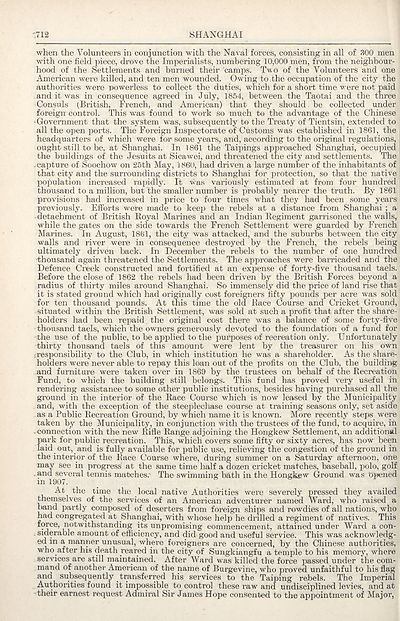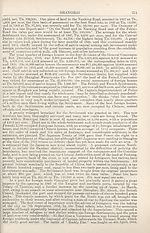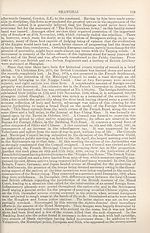1918
(786) Page 712
Download files
Complete book:
Individual page:
Thumbnail gallery: Grid view | List view

712
SHANGHAI
when the Volunteers in conjunction with the Naval forces, consisting in all of 300 men
with one field piece, drove the Imperialists, numbering 10,000 men, from the neighbour¬
hood of the Settlements and burned their camps. Tw o of the Volunteers and one
American were killed, and ten men wounded. Owing to.the occupation of the city the
authorities were powerless to collect the duties, which for a short time were not paid
.and it was in consequence agreed in July, 1854, between the Taotai and the three
•Consuls (British, French, and American) that they should be collected under
foreigix control. This was found to work so much to the advantage of the Chinese
•Government that the system was, subsequently to the Treaty of Tientsin, extended to
all the open ports. The Foreign Inspectorate of Customs was established in 1861, the
headquarters of which wrere for some years, and, according to the original regulations, ;
ought still to be, at Shanghai. In 1861 the Taipings approached Shanghai, occupied
the buildings of the Jesuits at Sicawei, and threatened the city and settlements. The
capture of Soochow on 25th May, i860, had driven a large number of the inhabitants of
that city and the surrounding districts to Shanghai for protection, so that the native
population increased rapidly. It was variously estimated at from four hundred
thousand to a million, hut the smaller number is probably nearer the truth. By 1861
provisions had increased in price to four times what they had been some years
previously. Efforts were made to keep the rebels at a distance from Shanghai; a
-detachment of British Royal Marines and an Indian Regiment garrisoned the walls,
while the gates on the side towards the French Settlement were guarded by French
Marines. In August, 1861, the city was attacked, and the suburbs between the city
walls and river were in consequence destroyed by the French, the rebels being
ultimately driven back. In December the rebels to the number of one hundred
thousand again threatened the Settlements. The approaches were barricaded and the
Defence Creek constructed and fortified at an expense of forty-five thousand taels.
Before the close of 1862 the rebels had been driven by the British Forces beyond a
radius of thirty miles around Shanghai. So immensely did the price of land rise that
it is stated ground which had originally cost foreigners fifty pounds per acre was sold
for ten thousand pounds. At this time the old Race Course and Cricket Ground,
situated within the British Settlement, was sold at such a profit that after the share¬
holders had been repaid, the original cost there was a balance of some forty-five
thousand taels, which the owners generously devoted to the foundation of a fund for
the use of the public, to be applied to the purposes of recreation only. Unfortunately
thirty thousand taels of this amount were lent by the treasurer on his own
. responsibility to the Club, in which institution he was a shareholder. As the share¬
holders were never able to repay this loan out of the profits on the Club, the building
and furniture were taken over in 1869 by the trustees on behalf of the Recreation
Fund, to which the building still belongs. This fund has proved very useful in
rendering assistance to some other public institutions, besides having purchased all the
ground in the interior of the Race Course which is now leased by the Municipality
and, with the exception of the steeplechase course at training seasons only, set aside
as a Public Recreation Ground, by which name it is known. More recently steps were
taken by the Municipality, in conjunction with the trustees of the fund, to acquire, in
connection with the new Rifle Range adjoining the Hongkew Settlement, an additional
park for public recreation. This, which covers some fifty or sixty acres, has now been
laid out, and is fully available for public use, relieving the congestion of the ground in
the interior of the Race Course where, during summer on a Saturday afternoon, one
may see in progress at the same time half a dozen cricket matches, baseball, polo, golf
and^several tennis matches.' The swimming bath in the Hongkew Ground was Opened
At the time the local native Authorities were severely pressed they availed
themselves of the services of an American adventurer named Ward, who raised a
band partly composed of deserters from foreign ships and rowdies of all nations, who
had congregated at Shanghai, with whose help he drilled a regiment of natives. This
force, notwithstanding its unpromising commencement, attained under Ward a con-
: siderable amount of efficiency, and did good and useful service. This was acknowledg-
ed m a manner unusual, where foreigners are concerned, by the Chinese authorities,
who after his death reared in the city of Sungkiangfu a temple to his memory, where
services are still maintained. After Ward was killed the force passed under the com¬
mand of another American of the name of Burgevine, who proved unfaithful to his flag
and subsequently transferred his services to the Taiping rebels. The Imperial
Authorities found it impossible to control these raw and undisciplined levies, and at
• their earnest request Admiral Sir James Hope consented to the appointment of Major,
SHANGHAI
when the Volunteers in conjunction with the Naval forces, consisting in all of 300 men
with one field piece, drove the Imperialists, numbering 10,000 men, from the neighbour¬
hood of the Settlements and burned their camps. Tw o of the Volunteers and one
American were killed, and ten men wounded. Owing to.the occupation of the city the
authorities were powerless to collect the duties, which for a short time were not paid
.and it was in consequence agreed in July, 1854, between the Taotai and the three
•Consuls (British, French, and American) that they should be collected under
foreigix control. This was found to work so much to the advantage of the Chinese
•Government that the system was, subsequently to the Treaty of Tientsin, extended to
all the open ports. The Foreign Inspectorate of Customs was established in 1861, the
headquarters of which wrere for some years, and, according to the original regulations, ;
ought still to be, at Shanghai. In 1861 the Taipings approached Shanghai, occupied
the buildings of the Jesuits at Sicawei, and threatened the city and settlements. The
capture of Soochow on 25th May, i860, had driven a large number of the inhabitants of
that city and the surrounding districts to Shanghai for protection, so that the native
population increased rapidly. It was variously estimated at from four hundred
thousand to a million, hut the smaller number is probably nearer the truth. By 1861
provisions had increased in price to four times what they had been some years
previously. Efforts were made to keep the rebels at a distance from Shanghai; a
-detachment of British Royal Marines and an Indian Regiment garrisoned the walls,
while the gates on the side towards the French Settlement were guarded by French
Marines. In August, 1861, the city was attacked, and the suburbs between the city
walls and river were in consequence destroyed by the French, the rebels being
ultimately driven back. In December the rebels to the number of one hundred
thousand again threatened the Settlements. The approaches were barricaded and the
Defence Creek constructed and fortified at an expense of forty-five thousand taels.
Before the close of 1862 the rebels had been driven by the British Forces beyond a
radius of thirty miles around Shanghai. So immensely did the price of land rise that
it is stated ground which had originally cost foreigners fifty pounds per acre was sold
for ten thousand pounds. At this time the old Race Course and Cricket Ground,
situated within the British Settlement, was sold at such a profit that after the share¬
holders had been repaid, the original cost there was a balance of some forty-five
thousand taels, which the owners generously devoted to the foundation of a fund for
the use of the public, to be applied to the purposes of recreation only. Unfortunately
thirty thousand taels of this amount were lent by the treasurer on his own
. responsibility to the Club, in which institution he was a shareholder. As the share¬
holders were never able to repay this loan out of the profits on the Club, the building
and furniture were taken over in 1869 by the trustees on behalf of the Recreation
Fund, to which the building still belongs. This fund has proved very useful in
rendering assistance to some other public institutions, besides having purchased all the
ground in the interior of the Race Course which is now leased by the Municipality
and, with the exception of the steeplechase course at training seasons only, set aside
as a Public Recreation Ground, by which name it is known. More recently steps were
taken by the Municipality, in conjunction with the trustees of the fund, to acquire, in
connection with the new Rifle Range adjoining the Hongkew Settlement, an additional
park for public recreation. This, which covers some fifty or sixty acres, has now been
laid out, and is fully available for public use, relieving the congestion of the ground in
the interior of the Race Course where, during summer on a Saturday afternoon, one
may see in progress at the same time half a dozen cricket matches, baseball, polo, golf
and^several tennis matches.' The swimming bath in the Hongkew Ground was Opened
At the time the local native Authorities were severely pressed they availed
themselves of the services of an American adventurer named Ward, who raised a
band partly composed of deserters from foreign ships and rowdies of all nations, who
had congregated at Shanghai, with whose help he drilled a regiment of natives. This
force, notwithstanding its unpromising commencement, attained under Ward a con-
: siderable amount of efficiency, and did good and useful service. This was acknowledg-
ed m a manner unusual, where foreigners are concerned, by the Chinese authorities,
who after his death reared in the city of Sungkiangfu a temple to his memory, where
services are still maintained. After Ward was killed the force passed under the com¬
mand of another American of the name of Burgevine, who proved unfaithful to his flag
and subsequently transferred his services to the Taiping rebels. The Imperial
Authorities found it impossible to control these raw and undisciplined levies, and at
• their earnest request Admiral Sir James Hope consented to the appointment of Major,
Set display mode to:
![]() Universal Viewer |
Universal Viewer | ![]() Mirador |
Large image | Transcription
Mirador |
Large image | Transcription
Images and transcriptions on this page, including medium image downloads, may be used under the Creative Commons Attribution 4.0 International Licence unless otherwise stated. ![]()
| Asian directories and chronicles > 1918 > (786) Page 712 |
|---|
| Permanent URL | https://digital.nls.uk/194903548 |
|---|
| Attribution and copyright: |
|
|---|---|
| Description | Volumes from the Asian 'Directory and Chronicle' series covering 1917-1941, but missing 1919 and 1923. Compiled annually from a multiplicity of local sources and research. They provide listings of each country's active corporations, foreign residents and government agencies of all nationalities for that year, together with their addresses. Content includes: various treaties; coverage of conflicts; currencies and taxes; consular fees; weights and measures; public holidays; festivals and traditions. A source of information for both Western states and communities of foreigners living in Asia. Published by Hongkong Daily Press. |
|---|---|
| Shelfmark | H3.86.1303 |
| Additional NLS resources: |

